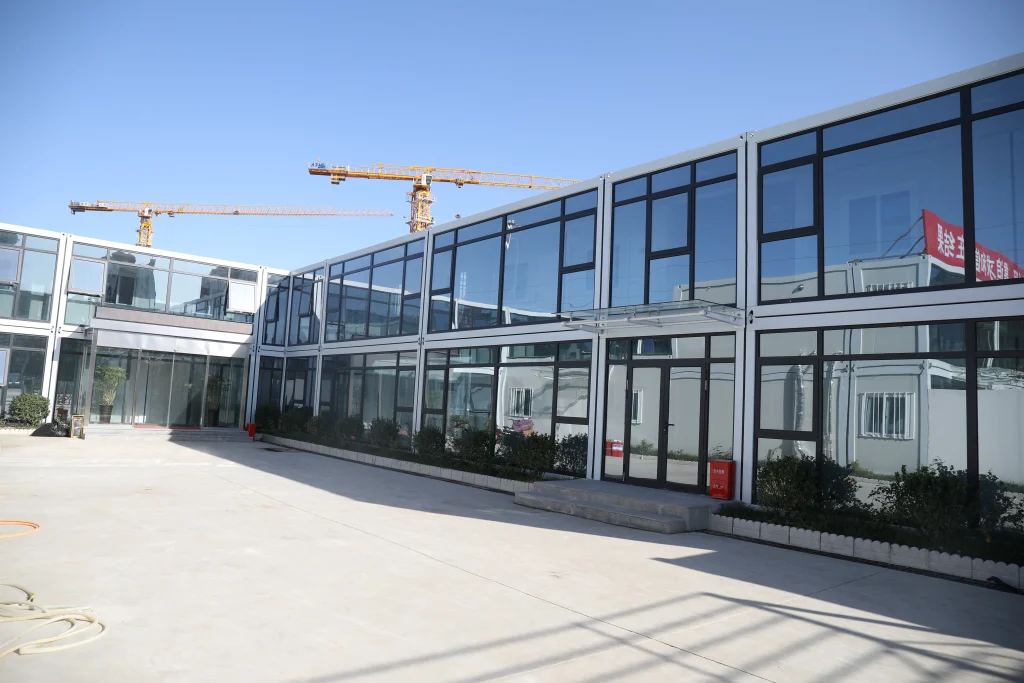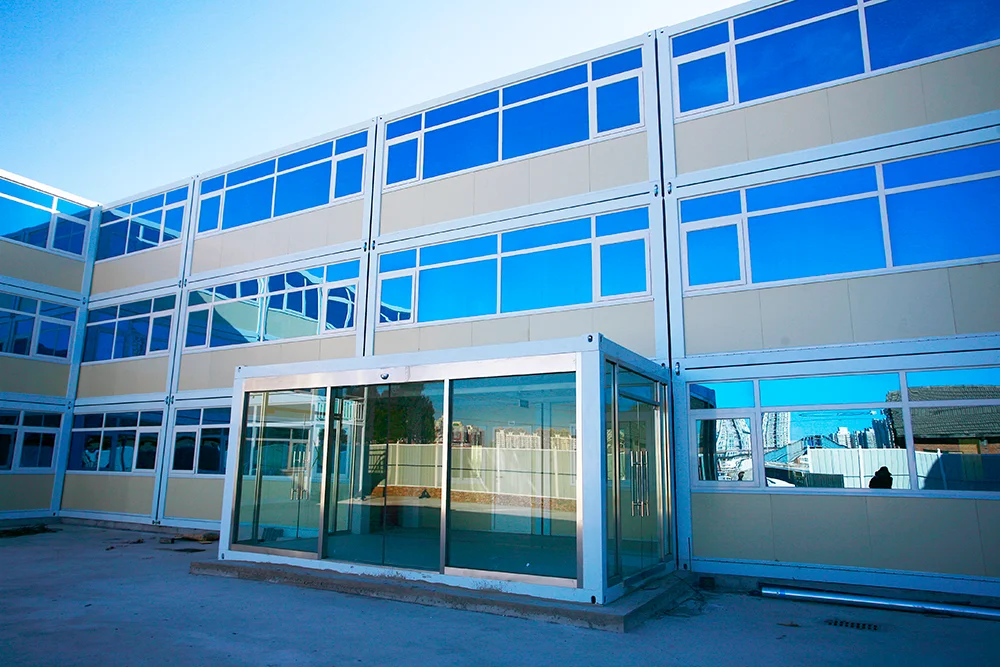What Makes Modular Accommodation the Perfect Choice for Remote Locations
What Makes Modular Accommodation the Perfect Choice for Remote Locations

What is Modular Accommodation?
Definition of Modular Accommodation
Modular accommodation means buildings made in pieces, or modules, in a factory. These pieces are then moved to the site and put together fast. Unlike regular buildings, which take a long time to build on-site, modular accommodation is quick to set up. It’s a high-quality, low-cost way to make housing, especially in faraway areas where building the usual way is hard.
Types of Modular Accommodation
There are different kinds of modular accommodation for different needs in remote places:
- Container Homes: These are tough units used for worker camps. They’re easy to move and set up. You can make them simple or add cool stuff like kitchens and bathrooms.
- Flat-Pack Modular Units: These come in flat pieces and are built on-site. They’re great for quick setup and can be changed to fit short or long projects.
- Relocatable Cabins: These are for longer stays. You can move them easily when the project moves or isn’t needed anymore.
Why Modular Accommodation is Ideal for Remote Locations
Speed of Construction
Modular accommodation is super fast to build, which is perfect for remote spots. Regular building takes a long time because of bad weather, not enough workers, or trouble getting materials to faraway places. Modular accommodation skips these problems. Most of the work happens in a factory.
For example, GS Housing makes its units in special factories. Then, they send them to the site for quick setup. This means housing is ready in days, not months. It’s awesome for industries like mining, oil work, or disaster relief, where you need homes fast.
Cost-Effectiveness
Modular accommodation saves a lot of money compared to regular building. Factory work cuts down on workers needed at the site. Plus, buying materials in bulk lowers costs. There are also fewer delays from bad weather or missing workers in remote areas.
GS Housing’s work on big projects, like the NEOM project in Saudi Arabia, shows how modular homes save cash. They can set up thousands of units quickly and well. This helps companies stay on budget while giving workers nice places to live.
Flexibility and Customization
Modular accommodation is super flexible. You can change the units to fit what you need, like simple dorms for workers or fancy setups with kitchens and lounges. This makes them great for all kinds of jobs, from oil camps to medical centers.
GS Housing works with clients to make modular homes that match their needs exactly. Whether it’s a short-term camp or a long-term setup, these buildings can be tweaked to work just right. This flexibility is hard to beat.
Durability and Safety in Harsh Environments
Withstanding Extreme Weather
Remote places often have tough weather, like hot deserts or freezing cold areas. Modular accommodation is built to handle these challenges. Strong materials and careful factory work make sure these units stay safe and comfy, no matter the weather.
GS Housing’s units are tested for extreme conditions. They keep workers safe and cozy in tough spots. This makes them a reliable choice where regular buildings might not hold up.
Robust Design Features
Modular units are made tough. They use steel frames, strong walls, and solid bases to stay sturdy. This design makes them great for remote sites. They don’t need fancy equipment to set up, which lowers risks in far-off places.
Environmental Sustainability of Modular Accommodation
Reduced Waste and Carbon Footprint
Modular accommodation is good for the planet. Building in a factory cuts down on waste because materials are used carefully. There’s less extra stuff thrown away. Plus, factories can recycle materials, which helps the environment even more.
GS Housing’s units follow green building rules. They use less energy during building and make the finished homes energy-efficient. This helps companies meet eco-friendly goals.
Reusability and Adaptability
Modular units can be moved and used again. This is awesome for industries that work in one spot for a while and then move to another. When a project is done, you can take the units apart and set them up somewhere else.
GS Housing designs its units to be reusable. This saves money and helps the planet by reducing the need for new buildings. It’s a smart choice for long-term projects.
Applications of Modular Accommodation in Remote Locations
Mining and Oil Fields
Mining and oil industries work in tough, faraway places. Modular accommodation is perfect here. It’s quick to set up, saves money, and is strong enough for harsh conditions. GS Housing has sent modular units to oil fields and mines, giving workers safe, comfy homes. Such as the Indonesian mining camp project, the Pakistani hydropower station camp project, and the Russian natural gas camp project.
Disaster Relief and Emergency Housing
After disasters like floods or earthquakes, people need homes fast. Modular accommodation is a quick fix. Units can be set up in days to give people a safe place to stay. GS Housing has helped with disaster relief by sending modular homes to areas in need. For example, GS Housing provided temporary housing for victims of the May 12 earthquake in Wenchuan, China, as well as temporary housing for victims of floods and mudslides.
Military and Defense
Military bases in remote spots need housing that’s easy to move and set up. Modular accommodation fits the bill. It’s flexible and can be customized for soldiers’ needs. GS Housing’s units are used by militaries around the world to provide safe, secure homes. Such as Camp housing for the 60th anniversary of the founding of the People’s Republic of China, camp housing for the 70th anniversary of the founding of the People’s Republic of China, and mobile camp housing for the battlefield.

Case Studies of Successful Modular Accommodation Projects
NEOM Project (Saudi Arabia)
GS Housing helped with the NEOM project in Saudi Arabia, a huge city-building plan. They sent thousands of modular units to house workers in the desert. These units were set up fast and kept workers comfy in tough conditions. This shows how modular homes can handle big, remote projects.
Container Accommodation in Remote Oil Fields
In far-off oil fields, container homes are a go-to choice. They’re tough, easy to move, and can be customized. GS Housing’s container units have been used in oil fields worldwide. They give workers safe, reliable homes in hard-to-reach places.
Extra Tips for Using Modular Accommodation
Plan for Your Site’s Needs
Think about what your site needs before picking modular units. Do you need simple dorms or fancy setups with kitchens? GS Housing can help you choose units that fit your project perfectly, like adding extra insulation for cold areas.
Check Quality Regularly
After setting up modular units, check them often to make sure they’re in good shape. Look for wear or damage, especially in tough weather. Regular checks keep the units safe and comfy for workers.
Train Workers on Setup
Make sure your team knows how to set up and care for modular units. GS Housing can share tips on putting units together fast and keeping them clean. A trained team makes setup smooth and keeps homes in top shape.
Work with Experts
Partner with GS Housing for advice on picking the best units. They know what works in remote spots and can suggest designs that save time and money. A good partner makes your project easier.
Future of Modular Accommodation in Remote Locations
Technological Advancements
Modular accommodation is getting even better with new tech. Smart homes with cool gadgets, like automatic lights or climate control, make units more comfy and efficient. GS Housing is adding these new features to their designs to keep up with modern needs.
Growth and Market Trends
The modular accommodation market is growing fast. More industries see how quick, cheap, and green these homes are. As more companies need housing in remote spots, modular units will become even more popular. GS Housing is ready to lead the way with new ideas.
Conclusion
Modular accommodation is a fantastic choice for remote locations. It’s fast, saves money, lasts long, and is good for the planet. Whether for oil fields, military bases, or disaster relief, companies like GS Housing make high-quality, customizable units that fit tough environments. As the need for flexible, green housing grows, modular accommodation will keep being a top pick for remote projects.
FAQ
Q1. Why is modular accommodation great for remote locations?
A: Modular accommodation is fast to build, saves money, stays strong in tough weather, and can be changed to fit different jobs.
Q2. How long does it take to set up modular accommodation in remote areas?
A: Modular units can be ready in just a few days, way faster than regular buildings.
Q3. Can modular accommodation be used for long-term projects?
A: Yes! Modular units work for both short and long projects. They can be moved and reused, which makes them super flexible.



